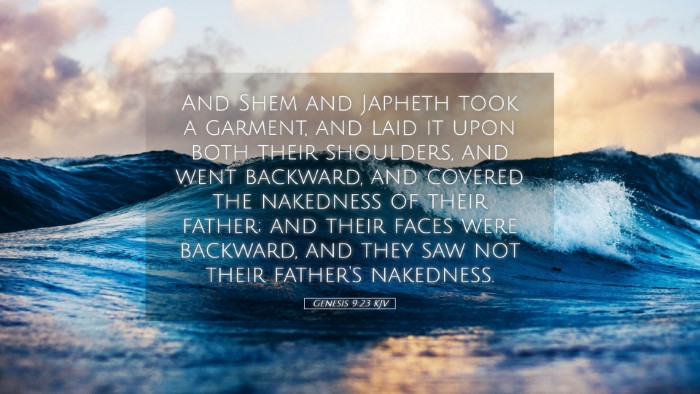Commentary on Genesis 9:23
Verse: Genesis 9:23 - "And Shem and Japheth took a garment, and laid it upon both their shoulders, and went backward, and covered the nakedness of their father; and their faces were backward, and they saw not their father's nakedness."
Introduction
The importance of Genesis 9:23 is underscored by its context within the narrative following the flood and the establishment of a new order among humanity. The actions of Shem and Japheth, in contrast to the behavior of Ham, highlight themes of respect, honor, and the consequences of sin.
Summary of Commentaries
1. Matthew Henry's Commentary
Matthew Henry emphasizes the moral lessons present within this text. He notes the actions of Shem and Japheth as a model of filial piety and respect. By covering their father's nakedness, they acted honorably and demonstrated a principle of modesty and discretion. Henry remarks on the implicit judgment against Ham, who not only failed to protect his father’s dignity but also exposed him to ridicule.
Key Insights:
- Decorum: The contrasting reactions of Ham and his brothers highlight how decorum and respect for parents should be upheld.
- Lessons on Modesty: The act of covering represents a broader biblical principle of modesty and protection of human dignity.
- Consequences of Sin: The narrative foreshadows the consequences of Ham's actions, establishing a theme that dishonor leads to larger societal issues.
2. Albert Barnes' Notes on the Bible
Albert Barnes provides a detailed analysis of the cultural implications of the term 'nakedness' used in this context. He suggests that this incident reflects the ancient Near Eastern understanding of shame associated with nakedness and the need to protect one’s family from public disgrace. Barnes points out that the act of Shem and Japheth was not only protective but also an affirmation of their righteousness compared to Ham.
Key Insights:
- Cultural Context: Understanding the cultural significance of nakedness in biblical times enhances the depth of this passage.
- Contrast of Behaviors: The differing responses to Noah's state serve as a lesson for generations in familial responsibilities.
- Spiritual Implications: The notion of “covering” can be interpreted spiritually, suggesting the covering of sins and imperfections through the righteousness of Christ.
3. Adam Clarke’s Commentary
Adam Clarke offers a theological reflection on the significance of the names Shem and Japheth, suggesting that their actions were divinely inspired. Clarke indicates that Shem represents the line through which the promised Messiah would eventually come, establishing a direct connection between obedience and divine favor. Japheth is associated with expansion and blessing, showing God's mercy extended to all nations.
Key Insights:
- Divine Providence: Clarke suggests that the actions taken by Shem and Japheth were part of a larger divine plan.
- Shem and Japheth's Legacy: Their honor in this story is contrasted with Ham's shame, echoing through the lineage that follows.
- Broader Theological Themes: The themes of redemption and covering are echoed throughout Scripture, culminating in New Testament teachings.
Theological Reflection
This verse invites deeper reflection on the nature of sin and the fabric of familial relationships. The actions of Shem and Japheth serve as a reminder of godly virtues such as respect, love, and humility. In a broader sense, it also speaks to the Christian call to cover one another in love and to refrain from judgment that leads to shame.
Application for Today's Believers
For pastors and theologians, Genesis 9:23 is an invitation to teach the value of honor within families and communities. In pastoral care, encouraging congregants to foster an environment that reflects the respect shown by Shem and Japheth can lead to healthier relationships. Moreover, understanding the implications of Ham’s actions can serve as a cautionary tale regarding gossip, shame, and the consequences of dishonoring others.
Conclusion
Ultimately, Genesis 9:23 is more than a historical account; it is a profound lesson of dignity, respect, and the Christian imperative of mutual support in times of vulnerability. Drawing from the insights of respected commentators enriches our understanding and emphasizes the timeless relevance of scripture in guiding ethical conduct and relational integrity.


